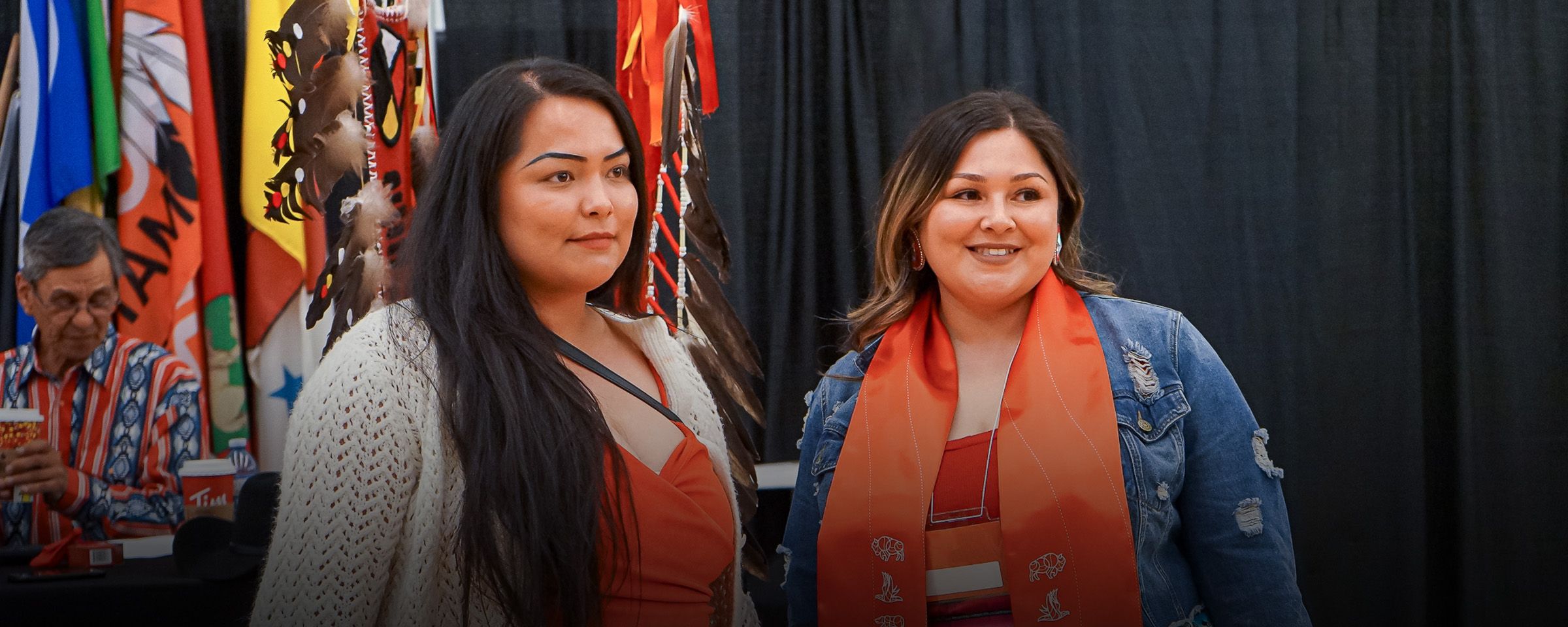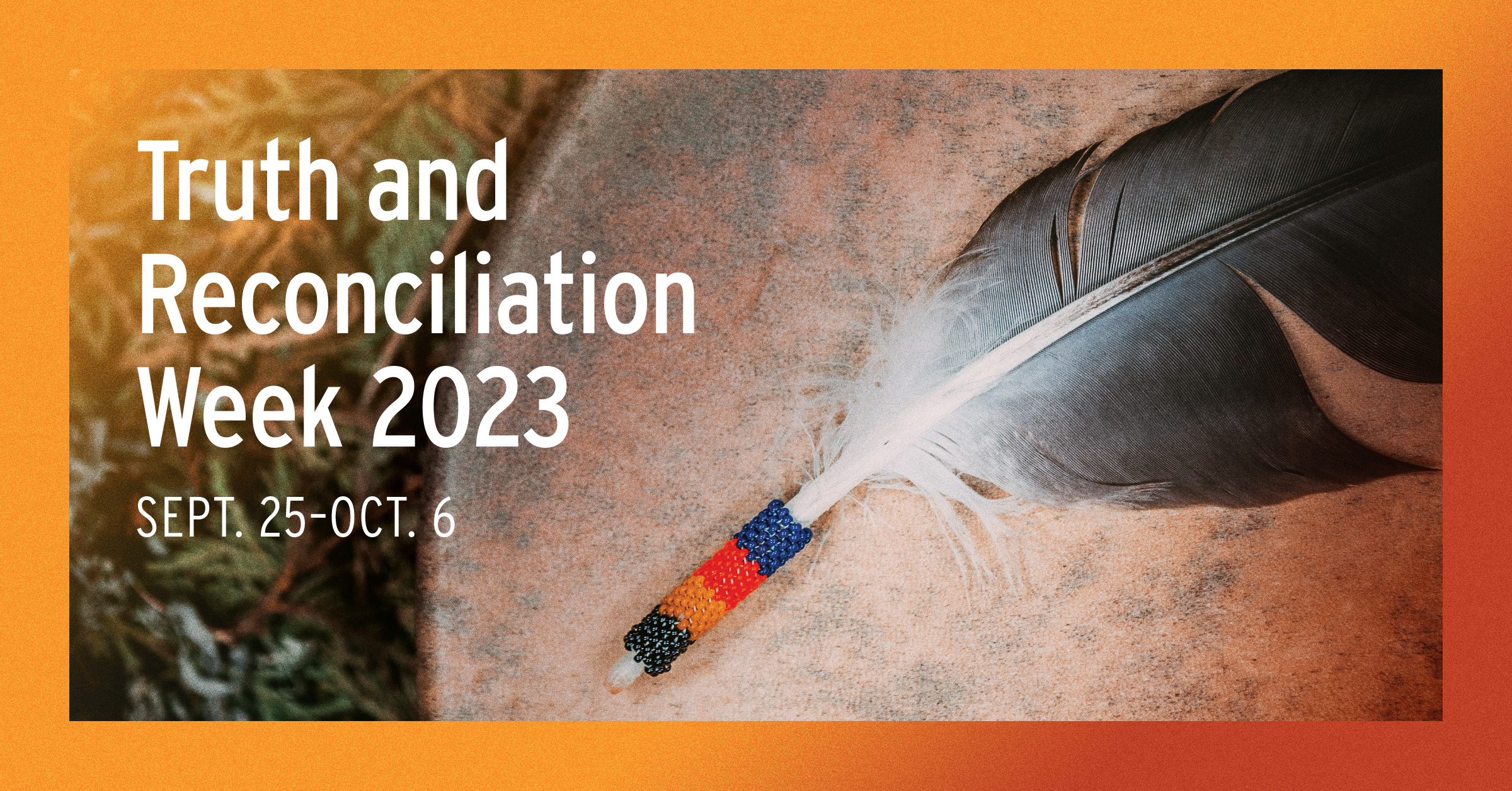Truth and Reconciliation Week 2023
All students, staff and faculty are invited to participate in RRC Polytech’s fifth annual Truth and Reconciliation Week, September 25 to October 6, 2023.
Through in-person events and self-guided learning offered by departments across the College, you’ll deepen your knowledge and understanding of Canada’s true history, Indigenous cultures, and spark conversations and take action towards Truth and Reconciliation.
This year’s event has been expanded to two weeks to enhance the opportunities for the College community to participate and includes sessions featuring special guests.
We look forward to fostering learning, healing and building stronger relationships.
Please stay tuned to this page for session updates.
Schedule of Events
Truth and Reconciliation Week – Daily Activities
Truth and Reconciliation Immersion Room Experience – EMERGING MEDIA AND PRODUCTION STUDIOS, GM-33, MALL LEVEL (by the North Gym), NOTRE DAME CAMPUS
Immerse yourself in an introductory story of Truth and Reconciliation, from the relationship with “Earth Mother” to the experience of residential schools, this 10-minute installation is about healing and respect. Brought to you from the Emerging Media and Production Immersion Room (GM-39), this 360° media rich installation provides an opportunity to learn, discuss, and share thoughts and experiences related to Truth and Reconciliation.
Drop-in to the Immersion Room Experience:
- Monday, Sept 25 at 12pm; 12:20pm; 12:40pm
- Tuesday, Sept 26 at 2pm; 2:20pm; 2:40pm
- Thursday, Sept 28 at 12pm; 12:20pm; 12:40pm
- Friday, Sept 29 at 12pm; 12:20pm; 12:40pm
- Tuesday, Oct 3 at 12pm; 12:20pm; 12:40pm
- Thursday, Oct 5 at 12pm; 12:20pm; 12:40pm
- Friday, Oct 6 at 12pm; 12:20pm; 12:40pm
Registration is not required.
Monday, September 25
Fall Equinox – Roundhouse Auditorium, Manitou a bi Bii daziigae, Exchange District Campus
10am – 12pm
The Fall Equinox is one of the four transitory events that marks the changing of the seasons, along with the Winter and Summer Solstices and the Spring Equinox. The Fall Equinox is the moment in the Earth’s cycle when the Sun crosses the equator into the southern hemisphere. In the Fall, we harvest our crops and prepare for the long winter when the land is protected by a blanket of snow.
This Fall Equinox will open RRC Polytech’s fifth annual Truth and Reconciliation Week and usher in the new season with a Pipe Ceremony, followed by a Sharing Circle led by Elder-in-Residence Paul Guimond and Knowledge Keeper-in-Residence Richard Curé. We will close out with a Feast to celebrate the changing of the season.
All are welcome, no registration needed.
Why Reconciliation? A Presentation with Knowledge Keeper Allen Sutherland
11am – 1 pm, Selkirk Campus
Students attending the Selkirk Campus are invited to join Allen Sutherland, RRC Polytech Knowledge Keeper, for a presentation examining Canada’s long history of colonialism and assimilation, and how this history has impacted and continues to impact Indigenous peoples today.
Registration is not required. Pizza lunch will be provided.

About Allen Sutherland
Allen Sutherland, Waabishki Mazinazoot Mishtaatim (White Spotted Horse), Anishinaabe, of the Bizhiw Doodem (Lynx Clan), Skownan First Nation, Treaty 2 Territory.
Allen Sutherland is currently the Life Long Learning Lodge Keeper, Government of First Nations Treaty 2 Territory. Allen is also an independent consultant and provides facilitation and training under his own company, WHITE SPOTTED HORSE. In 2014, he was the recipient of the Aboriginal Circle of Educators ‘Researcher and/or Curriculum Development’ award for developing the Canadian Indigenous Historical Timeline poster that is now currently being utilized in the Treaty Kits of Treaty Relations Commission of Manitoba. Allen is an Anishinaabek Traditional Knowledge Keeper, providing traditional ceremonies, teachings, spiritual advice, and healing.
Indigenous Voices Book Table
1pm – 3pm, Roblin Centre Atrium, Exchange District Campus
Visit RRC Polytech’s Library and Academic Services team at the pop-up Book Table, highlighting Indigenous authors. Staff and students can sign out books, and the Library team can look up titles or make recommendations.
Land Acknowledgement Workshop – Roundhouse Auditorium, Manitou a bi Bii daziigae, Exchange District Campus
2pm – 3pm
In today’s diverse and inclusive environment, recognizing and honouring the land upon which we work and learn is a vital step towards reconciliation and cultural awareness.
During this interactive session, guided by Gerald Sereda, participants will learn about land acknowledgments and gaining a deeper understanding of their significance. We’ll explore various types of land acknowledgments, from traditional to contemporary, and examine how they can be tailored to reflect our unique connections to the land.
Key workshop highlights include:
- Types of Land Acknowledgments: Learn about different styles of land acknowledgments, including the traditional and contemporary approaches.
- Crafting Your Personal Statement: you’ll have the opportunity to draft your own personalized land acknowledgment that reflects your personal connection to the land and Indigenous communities.
- Cultural Sensitivity: Understand the nuances and cultural considerations that should inform your acknowledgment, ensuring it is respectful, authentic, and meaningful.
- Impact and Engagement: Discover how a well-crafted land acknowledgment can foster inclusivity, encourage dialogue, and contribute to the broader goal of reconciliation within our institution.
By the end of this workshop, you will have a personalized land acknowledgment and the knowledge and confidence to share it genuinely. Join us on this transformative journey towards recognizing the importance of land acknowledgments and honoring the Indigenous peoples on whose land we live, work, and learn. Together, we can take meaningful steps towards building a more inclusive community at RRC Polytech.
About Gerald Sereda
Gerald is an Educational Developer at RRC Polytech, with an Indigenous Focus. He was born in Treaty 1 territory and comes from a Métis/Cree background. Gerald received his Bachelor of Computer Science, and Bachelor of Education before enrolling in the Master of Education program with a focus on curriculum design and development with coursework in Educational/Assistive technology, and Indigenous education.
He has worked in various capacities as an elementary, middle school, high school teacher, and counsellor in various schools and districts. He comes with over 18 years as a teacher, counsellor, and assistive technology consultant from Alberta. Gerald is excited to be a part of Red River College Polytechnic to support the integration of Indigenous language and culture into course design.
In his spare time, Gerald enjoys hockey, sports, working out, and yoga.
Tuesday, September 26
Truth and Reconciliation Immersive Experience: From the Strategic Plan to the Classroom – EMP Immersion Room, GM-33, Mall Level (by the North Gym), Notre Dame Campus
10am – 11am & 12pm – 1pm
Are you a Chair or Instructor working on how to meaningfully embed Indigenous content and perspectives in your courses? This session, guided by Nora Sobel, will offer an inspiring approach on how we can capture the intended outcomes of a college-wide strategic priority, such as “Commit to Truth and Reconciliation in everything we do” and create a sustainable and inclusive resource that can be employed by the entire college and make it all the way to our students in the classroom. The journey doesn’t stop there: Our students, as champions for change, can multiply this learning and action in the industry and community. Brought to you from Emerging Media’s Immersion Room, this session will open with a 10-minute, introductory, 360° media-rich installation on Truth and Reconciliation.
Registration is required as capacity is limited.
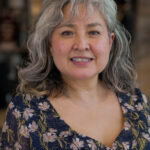
About Carla Kematch
Carla Kematch is a First Nation Cree woman from Sapatowiak Cree Nation located on Treaty 4 Territory. Working at Red River College Polytech she is involved in many aspects of the College to promote and increase the knowledge base around Truth and Reconciliation. Providing guidance and working cross departmentally to develop training initiatives for students, staff and faculty, policy development, research projects are some examples to meet the needs for implementing Commitment # 2: Commit to Truth and Reconciliation, Pursue Equity, Diversity and inclusion in everything we do. Carla also works with many external partners to promote collaboration and engagement to raise RRC Polytech’s profile with Indigenous communities, other post-secondary institutes, and non-profit organizations.

About Nora Sobel
Originally from Buenos Aires, Argentina, Nora Sobel is an intercultural communication, qualitative research, and project management specialist.
In 2008, Nora joined RRC Polytech and worked for 14 years in the College’s Diversity and Intercultural area. Nora joined the Applied Commerce and Management Education department in 2022 as an Instructor of Project Management and Analysis in the Business Administration Program.
Nora received her Bachelor of Arts in Communication Studies (Major in Public Opinion and Advertisement) from University of Buenos Aires, and her Master of Education (Concentration in Adult and Post-Secondary Education) from University of Manitoba. Nora also completed a Certificate in Project Management from RRC Polytech. Nora has recently started the Teaching for Learning (TFL) program at the College, as well as a Post-Graduate Program in Research of Public Opinion with University of Buenos Aires.
In 2017, Nora was one of the recipients of the first RRC Polytech’s Sustainability Leadership Award for the development of the Gender and Sexual Diversity Awareness Online Course. In 2022, Nora was also one of the recipients of the first RRC Polytech’s Diversity and Inclusion Excellence Award for the development of a seven-module Anti-Racism Training for Students.
Anishinaabemowin and Bannock-Making Session – P107, Exchange District Campus
11am – 12pm
Have you ever heard the term “Miigwech” being used by our Anishinaabe friends and wondered what it meant? Or maybe you would like to learn how to say a simple greeting in Anishinaabemowin?
Learn how to make bannock, how to read the Anishinaabemowin alphabet, and how to say the ingredients for bannock in Anishinaabemowin with language instructor Corey Whitford. Featuring special guest, Chef Patrick Anderson.
Please note that this session is at capacity.

About Corey Whitford
Corey Ralph Whitford has been teaching at RRC Polytech in the Indigenous Languages Program for six years, teaching through activities that shape a better understanding of Anishinaabemowin. Corey is eager to share his knowledge and provide guidance in all class activities to his students.
Corey was born in Portage la Prairie, and raised in Sandy Bay. His parents are from Long Plain and Sandy Bay, and both were fluent Anishinaabeg. Corey’s family spoke/speaks Anishinaabemowin, so he naturally picked it up along the way.
Corey is passionate about serving his community and passing on Anishinaabemowin knowledge at the College level.
Lateral Violence to Kindness Workshop with Tanya Clark-Marinelli – Selkirk Lounge A1-47, Notre Dame Campus
11am – 1:30pm
Conscious kindness can help create a safe and inclusive work environment, develop a culture of belonging and respect, encourage open and honest communication, and provide employees with the resources they need to succeed.
This session will invite participants to consider conscious kindness as a critical communication technique, and provide specific tools to approach and repair a situation or interaction that has left someone hurt or offended. Through guided practice, participants will be able to learn and practice how to communicate with kindness while having a safe space to reflect on their own experiences and feelings. Participants will leave the session with new tools and strategies to foster more meaningful and compassionate communication.
The session will also introduce lateral violence, a concept that emerged from Indigenous knowledge and experience. It has been widely adopted to understand and address complex social dynamics within and between Indigenous communities.
About Tanya Clarke-Marinelli
Tanya Clarke-Marinelli is a proud First Nations woman from Hollow Water First Nation and the founder of TC Training Services. She served three years on the Board of Directors with the Indigenous Chamber of Commerce and serves as Vice President with Neemu-Egwah Inc.
Presentation with Elder Aaron Pierre – Portage La Prairie Campus
11am – 1:30pm
Students and staff at the Portage La Prairie Campus are invited to join Elder Aaron Pierre for a pizza lunch and learn.
About Elder Aaron Pierre
Boozhoo,
I would like to introduce myself to the best of my ability using Ojibwe first. Kaa-obashit mikinaak ndazhnikaas, ogiishkimansiin ndoodem, gichi-odena ndonji, my English name is Aaron Pierre and I was born and raised in Winnipeg. I have Ukrainian heritage on my mother’s side and Cree and Ojibwe on my father’s side. My family and I moved to Portage la Prairie in the fall of 2012, and I have worked in various organizations in the Portage and the surrounding area since that time. I started work with PCRC in July of 2022 as the Indigenous Seniors Resource Coordinator. In this role, I was connecting with indigenous seniors aged 55+ in the city of Portage la Prairie to help them remain living independently. Some of the services provided were yard work, snow removal, well-being checks, transportation to and from appointments and helping with groceries/food security.
I have recently transitioned into the role of Indigenous Community Coordinator. This role has numerous projects that are already ongoing and I am picking up where the previous worker left off. I have cultural knowledge gained by participating in ceremonies such as Sweat Lodge, Sun Dance, drum making, rattle making, dream catcher making and conducting Sharing Circles. Throughout the last 9 years I have been learning how to conduct and teach certain ceremonies like drum making, rattle making and dream catcher making to people of all ages and nationalities. I have experience in conducting sweat lodge and sharing circles throughout
the last 8 years.
Miigwech, thank you.
Wednesday, September 27
Teachings and Transformation – Medicine Wheel Garden, Notre Dame Campus
1pm – 3pm
Event update: Please note that due to unforeseen circumstances, Knowledge Keeper Richard Curé is unable to guide this session. The College community is invited to drop-in to the Medicine Wheel Garden for tea and bannock.
Join Knowledge Keeper-in-Residence Richard Curé in the Medicine Wheel Garden north-west of Notre Dame Campus for an afternoon of Teachings related to Medicines and the land, while working to transform the Medicine Wheel Garden from wild prairie into a true reflection of Indigenous Medicine. The different quarters of the Medicine Wheel correspond to North, East, South and West, and each contain many valuable Teachings and Stories.
Help prune, pull weeds and till the soil to prepare the garden for Medicine planting next spring.
Please dress appropriately for the weather and for the physical labour that’s involved with gardening. Consider wearing:
- Sturdy, comfortable closed-toe shoes
- Long pants (some plants are very tall, averaging at about waist height)
- A hat and sunglasses
- Gardening gloves
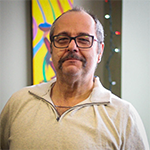
About Richard Curé, Keeper-in-Residence
Richard is part of the Sturgeon Clan, and his spirit name is Buffalo Man (Mashkode – Bizhiki). He is Métis and discovered the Red Road after becoming a foster parent with Sagkeeng Child and Family Services. Uncovering his Indigeneity and attending Sweat Lodges and Sundances helped Richard overcome personal adversities, such as the workplace injury that prevented him from continuing his career in mining.
For the last three years, Richard has been a Knowledge Keeper in Sagkeeng First Nation with Sagkeeng Anicinabe High School. He takes youth out onto the land picking medicine and collecting grandfathers (sacred stones for Sweat Lodges), firewood, and teepee poles. He and his wife Tammy have four children and four grandchildren. Richard has facilitated workshops such as medicine picking, hand drum building, and Sweat Lodges with organizations such as Ma Mawi Wi Chi Itata Center, Sagkeeng Child and Family Services and RRC Polytech.
Thursday, September 28
Blanket Exercise for staff – The Roundhouse, Manitou a bi Bii daziigae, Exchange District Campus
10am – 4pm
The Blanket Exercise is an experiential learning workshop for all RRC Polytech employees. It brings participants together to learn the effects of Canada’s shared historical colonization and allows people to relate to history from a first-person perspective. The Blanket Exercise helps direct our path forward in partnership with Indigenous Peoples to support our commitment in the 2022-2026 Strategic Plan to Truth and Reconciliation.
A team of trained facilitators guide participants assuming character roles of Indigenous People and government officials through a chronological narrative where blankets represent North America’s land base.
Through this facilitated simulation, you will experience your characters ‘outcome’ as you literally ‘walk’ through an experience of colonization to present day. The day also includes a de-brief sharing circle guided by a RRC Polytechnic Elder-in-Residence to discuss the learning experience, process feelings, ask questions, share insights, and deepen your understanding.
Registration is required as capacity is limited to 30 participants. Lunch will be provided.
Indigenous Voices Book Table
11am – 2pm, Library Hallway, Notre Dame Campus
Visit RRC Polytech’s Library and Academic Services team at the pop-up Book Table, highlighting Indigenous authors. Staff and students can sign out books, and the Library team can look up titles or make recommendations.
Friday, September 29
Campus Orange Shirt Day
All members of the RRC Polytech community are invited to wear an orange shirt in lieu of Orange Shirt Day, which falls on a Saturday this year.
Phyllis Webstad, whose orange shirt was taken away when she attended Residential School in the 1970s, started the Orange Shirt movement by sharing her story. Since 2013, the Orange Shirt Society has raised awareness of the impacts of Residential Schools and the work Survivors and their families do to heal Indigenous communities. September 30 has been declared the National Day for Truth and Reconciliation and recognized as Orange Shirt Day to honour Residential School Survivors, their communities, and the children who never came home.
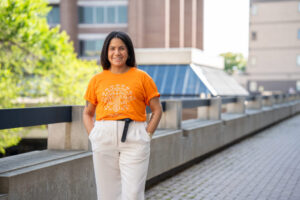
The Campus Store offers the original 2023 RRC Polytech Orange Shirt designed in collaboration with Inininew artist Leticia Spence and produced by Red Rebel Armour, owned and operated by Sean Rayland-Boubar. All proceeds from Orange Shirt Sales support the Mínwastánikéwin Truth and Reconciliation Award when applications open in January 2024.
Mínwastánikéwin is a Cree word meaning to set it right—the award, valued at $1,000, is intended to alleviate some of the financial burden Indigenous students experience each year. In 2022, artist Peatr Thomas created the first RRC Polytech Orange Shirt, the proceeds of which, along with a $1,000 donation from the Student Association, contributed to two students receiving the Mínwastánikéwin Truth and Reconciliation Award in February, 2023.
Student Sweat Lodge Ceremony – Medicine Wheel Garden, Notre Dame Campus
10am – 2pm
*Postponed*
Sweat Lodge Ceremonies are a positive way to heal and connect oneself physically, mentally, emotionally and spiritually. Join Elder-in-Residence, Paul Guimond, and Knowledge Keeper-in-Residence, Richard Curé, in the Medicine Wheel Garden for this academic year’s first Student Sweat Lodge followed by a Feast in the Indigenous Support Centre, F209.
Sweat Lodge Ceremonies typically lasts for about an hour and a half. The Lodge allows for 20 participants.
If you this is your first Sweat, please consider:
- Don’t bring jewelry, eyewear, or other valuables inside the Lodge.
Metal and plastic can heat up quickly and melt onto you or burn your skin and/or damage electronics. The Skaabe, or Helper, and other RRC Polytech staff will be present outside the Lodge to supervise the Sacred Fire and participants’ belongings. - Bring a towel, flipflops, a change of clothes, toiletries and/or a hairbrush.
You will sweat a lot. Consider bringing what you would bring to a workout in the gym. - Avoid eating a heavy meal before entering the Lodge.
The exertion from the heat may make some people feel unwell. - Sweat Lodge Ceremonies are often followed by a Feast to close out the event.
Please note that this session has been postponed. For information about upcoming student sweats, please email hscherban@rrc.ca.
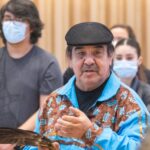
About Paul Guimond, Elder-in-Residence
Paul Guimond is part of the Turtle Clan and his spirit name is Okonace (Little Eagle Bone). He and his wife Kim have three children, 16 grandchildren and four great-grandchildren. Paul is a Sundance Bundle Carrier (Chief), Sweat Lodge Bundle Carrier (Water drum) and Dark Room Bundle Carrier. He studied Counselling Skills at the University of Manitoba. In Sagkeeng, Paul sat on Chief & Council for 20 years and served as the School Board Chairman for ten years. He is an active elder with Addictions Foundation of Manitoba and Sagkeeng Child & Family Services, offering healing, spiritual growth and personal development through ceremony, programming and establishing healthy relationships. Paul is also a certified coach in hockey, baseball and lacrosse. Paul joined the Elder-in-Residence Program at Red River College Polytechnic in 2018.

About Richard Curé, Knowledge Keeper-in-Residence
Richard is part of the Sturgeon Clan, and his spirit name is Buffalo Man (Mashkode – Bizhiki). He is Métis and discovered the Red Road after becoming a foster parent with Sagkeeng Child and Family Services. Uncovering his Indigeneity and attending Sweat Lodges and Sundances helped Richard overcome personal adversities, such as the workplace injury that prevented him from continuing his career in mining.
For the last three years, Richard has been a Knowledge Keeper in Sagkeeng First Nation with Sagkeeng Anicinabe High School. He takes youth out onto the land picking medicine and collecting grandfathers (sacred stones for Sweat Lodges), firewood, and teepee poles. He and his wife Tammy have four children and four grandchildren. Richard has facilitated workshops such as medicine picking, hand drum building, and Sweat Lodges with organizations such as Ma Mawi Wi Chi Itata Center, Sagkeeng Child and Family Services and RRC Polytech.
Approaches to Integrating Indigenous Histories and Perspectives in Settlement Language Training: CNI Research Presentation – The Roundhouse, Manitou a bi Bii daziigae, Exchange District Campus
12pm – 1pm
RRC Polytech’s Centre for Newcomer Integration (CNI) provides language training, employment-related and other services to support newcomers as they settle and integrate in Manitoba. Newcomers possess skills that contribute to the growth of our province, which welcomed nearly 22,000 permanent residents and refugees in 2022.
Immigration, Refugees and Citizenship Canada (IRCC) recently funded CNI to conduct research that explores what the settlement sector in Manitoba is doing (and could do) to integrate Indigenous histories and perspectives into language training for newcomers.
This project is in keeping with the Truth and Reconciliation Commission’s Calls to Action 62 and 93 to integrate Indigenous knowledge into classrooms and provide to newcomers an inclusive history of Indigenous Peoples of Canada.
Join Carla Kematch, Director, Truth and Reconciliation and Community Engagement, Clayton Lorraine, Lead Researcher and Instructor, CNI and Stuart Schwartz, Chair, CNI, to reflect on how we can better integrate Indigenous ways into training delivery.
Registration is not required to attend this session.
So They Will Know Film Screening and Director’s Talk with Fawnda Neckoway – The Roundhouse, Manitou a bi Bii daziigae, Exchange District Campus
2pm – 3pm
Fawnda Neckoway makes her directorial debut in this heartwarming 20-minute film in honour of a hopeful future when it comes to discussing a difficult part of history with the young ones in our lives. Inspired by an innocent question, and the literature of author David Robertson, “So They Will Know” features interviews with David Robertson, Wab Kinew, Bobbie Jo Leclair, Kimberly Giswein and Dr. Ramona Neckoway.
The name of the film was gifted from her aunt who said in a conversation ‘they need to know’, which later translated to the Ininew (Cree) language as Kita kiskithihtahkwaw: ‘So They Will Know’. We acknowledge the elders/survivors who lived through Residential Schools and remember the ones who did not make it home.

About Fawnda Neckoway
Fawnda Neckoway is an Ithinew Director & Filmmaker from the Nisichawayasihk Cree Nation, residing in Winnipeg. Committed to her pursuit of a lifelong goal, Fawnda is the Founder and Executive Creative Director of the newly established Production Company, Nikâwiy Productions. She holds experience in film as a Casting Director, and Actor and who’s recently begun Writing, Directing & Producing. As a multidisciplinary artist, Fawnda has accelerated into creating her own motion pictures with four short films within one year while pursuing her education and establishing her company. These films include, Kita kiskihtihtakwaw: So They Will Know, ᒪᐢᑭᓯᐣ: A Moccasin Creation Story, and If You’re Looking for a Sign, This Is It. She is currently in post-production with her latest film, Language Keepers, to which she was the recipient of the WFG MOSAIC Film Award. Fawnda recently completed a residency as part of Alanis Obomsawin’s Storytelling Workshop, is a recent graduate of Red River College Polytechnic’s Digital Film and Media Production Program, and was a participant of the Shine Networks Producers Accelerator Program. Her latest creatives have her engaged closely within her community, where she’s passionate about developing productions that nurture generational connection and Indigenous Storytelling. Fawnda is currently in development of her first scripted screenplay and is looking forward to sharing her latest productions, releasing in fall of 2023.
Saturday, September 30
National Day for Truth and Reconciliation and Orange Shirt Day
Monday, October 2
Statutory Holiday in lieu of the National Day for Truth and Reconciliation
Please note that RRC Polytech Campuses are closed today, Monday, Oct 2.
Tuesday, October 3
Session with Manitoba Inuit Association, F205, Notre Dame Campus
*Please note that this event has been postponed*
Join the Manitoba Inuit Association for a 45-minute presentation on the culture and history of Inuit peoples.
Drop-in – registration is not required!
Wednesday, October 4
Social Innovation and Community Development Student Panel – Agora, Manitou a bi Bii daziigae, Exchange District Campus
12pm – 1pm
Join second-year facilitation students in the Social Innovation and Community Development program for a fireside discussion on their experiences of Reconciliation from multiple perspectives. Both Indigenous and International students will reveal Reconciliation as a student at the college and how they have implemented the Calls to Action in their community work.
Registration is not required to attend.
Paint Night with Dawn Chartrand – Indigenous Support Centre, F209, Notre Dame Campus
5pm – 8pm
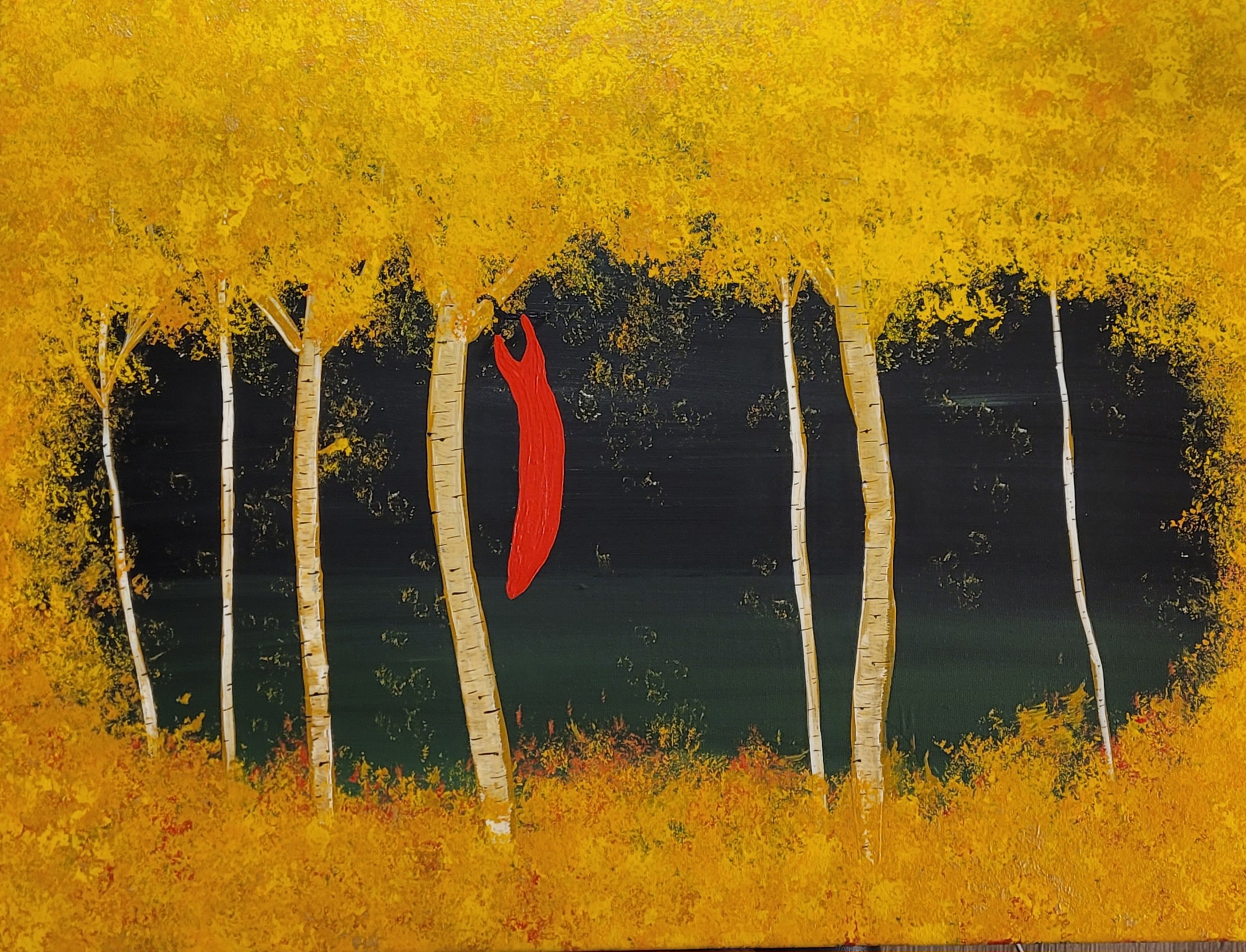
Join artist Dawn Chartrand to create a painting in honour of MMIWG2S. All supplies will be provided.
Registration is at capacity.
Thursday, October 5
Authors’ Talk with Douglas Sanderson and Andrew Stobo Sniderman – The Roundhouse, Manitou a bi Bii daziigae, Exchange District Campus
12pm – 1pm
Join Douglas Sanderson (Amo Binashii) and Andrew Stobo Sniderman to discuss Valley of the Birdtail: An Indian Reserve, a White Town and the Road to Reconciliation, their acclaimed book about how two Manitoban communities became separate and unequal—and what it means for the rest of us. This book follows multiple generations of two families, one white and one Indigenous, and weaves their lives into the larger story of Canada.
Registration is required as capacity is limited. Those who register and attend the session will receive a copy of Valley of the Birdtail.
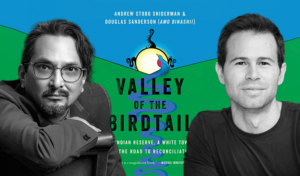
Douglas Sanderson (Amo Binashii) is Beaver Clan, from the Opaskwayak Cree Nation. He is a Fulbright Scholar, and holds the Prichard Wilson Chair in Law and Public Policy at the University of Toronto, Faculty of Law. Professor Sanderson has served as senior Advisor to the government of Ontario, in the offices of the Attorney General and Aboriginal Affairs.
Andrew Stobo Sniderman is a writer, lawyer and Rhodes Scholar from Montreal. He has written for the New York Times, the Globe and Mail and Maclean’s. He has also argued before the Supreme Court of Canada, served as the human rights policy advisor to the Canadian minister of foreign affairs, and worked for a judge of South Africa’s Constitutional Court.
Self-Guided Resources
Indigenous Resources Collection
Browse the Library’s newly created Indigenous Resources Collection and learn about the history, resilience, culture, and creativity of Indigenous peoples and communities! This curated collection is a living, breathing list with sub-collections about Truth and Reconciliation and residential schools. Sub-topics will continue to evolve and grow, with new resources being added on a regular basis. Access the resources, here.
Indigenous Education Guides
A set of guides featuring curated resources—both internal and external to the Library’s collection—on select topics related to Indigenous peoples. Access the guides, here.
Residential Schools
A resource guide created to recognize and honour the lost children and Survivors of residential schools, their families and communities. Access the guide, here.
Indigenous Health and Well-Being
A wealth of resources related to Indigenous Health, curated in one place for researching and browsing convenience. Access the guide, here.
Missing and Murdered Indigenous Women, Girls and Two-Spirit (MMIWG2S)
October 4 is the National Day of Action for MMIWG2S, which is dedicated specifically to raise awareness for people to learn more about the violence against Indigenous women, girls, and Two Spirit people and how they can support the 231 Calls to Justice of the National Inquiry’s Final Report.
Please note to access the resources below, you may be prompted to login with your College credentials.
- Library and Academic Services’ MMIWG Resource Guide
- Films and online streaming:
- Felicia Solomon’s Story (20 mins.) | 2015
As one family struggles to make their own peace with their daughter’s tragic death, they are opening up to try to stop the violence against Aboriginal women. Felicia Solomon was 16 years old when she went missing. Her tragic death didn’t end her story, though, because her family refuses to forget. - Tina Fontaine: A Murdered Girl’s Legacy (12 mins.) | 2019
Tina Fontaine was just 15 when her body, wrapped in a duvet cover and weighed down by rocks, was pulled from Winnipeg’s Red River. A report from the Manitoba Advocate for Children and Youth says in the years since her murder, not enough has changed to ensure other children in circumstances similar to Tina’s are not at risk. But Tina has left a legacy. Her death focused attention on missing, murdered Indigenous women and girls and inspired volunteer groups such as the Bear Clan Patrol to work at protecting vulnerable people on the streets. Warning: This program contains disturbing images and subject matter. Viewer discretion is advised. - National Film Board of Canada MMIWG Series:
- Finding Dawn (1 h 13 mins.) | 2006
- The Red Dress (27 mins.) | 1978
- This River (19 mins.) | 2016
- Felicia Solomon’s Story (20 mins.) | 2015
E-book: In this together: fifteen stories of Truth and Reconciliation
Editor: Danielle Metcalfe-Chenail
Description: An eye-opening collection of personal essays by Indigenous and non-Indigenous contributors from across Canada. Without flinching, the contributors—including journalists, academics, and artists-each explore their own “aha” moments regarding Canada’s colonial past and present to ask how we can all move forward in a spirit of reconciliation and anti-racism. Access the e-book, here.
Original RRC Polytech videos: Elders, Smudging and Language
This series of original RRC Polytech videos touch on local Indigenous cultural themes and practices that are embedded in the College.
What these videos have in common is that they touch on what all human beings need to survive: language, culture and family.
- Elders
Elders-in-Residence program ensures staff and students have access to Elders as well as playing an important role in the College’s senior leadership. Elders-in-Residence offer cultural teaching sessions, one-on-one appointments, classroom visits and lead ceremonies. Watch this video to learn more. - Smudging
RRC Polytech’s Indigenous Support Centres, both at the Exchange District and Notre Dame Campuses, are equipped with air exhaust systems so students can smudge. The Indigenous Student Supports and Community Relations department also ensures students have access to the medicines that they need to smudge. Watch this video to learn more. - Language
Language is fundamental to culture. The UN declared 2019, the International Year of Indigenous Languages and their concentrated efforts on preserving and revitalizing these languages. Watch this video to learn more.
NFB Collection: Indigenous Peoples in Canada (First Nations and Métis)
An online subject collection of Nation Film Board of Canada (NFB) videos. Videos marked CAMPUS are available courtesy of the Library’s subscription (College credentials may be required to log in). Access the film collection, here.
NFB Second Stories: It Had to Be Done
Tessa Desnomie – 2008 | 22 min
This short documentary explores the legacy of residential schools through the eyes of two extraordinary women who not only lived it, but who, as adults, made the surprising decision to return to the school that had affected their lives so profoundly. This intimate and moving film affirms their strength and dignity in standing up and making a difference on their own terms.
Watch It Had to Be Done, here. (You may be prompted to login with your College credentials)
Tuesday, October 10 & Wednesday, October 11
Truth and Reconciliation Week Sharing Circles
Tuesday, October 10, 12-1pm, F209, Notre Dame Campus
Wednesday, October 11, 12-1pm, D208, Notre Dame Campus
Bring your lunch and sit down with members of the College community to share your thoughts, experiences and what you’ve learned during Truth and Reconciliation Week. All staff and students are invited to join Carla Kematch, Director of Truth and Reconciliation and Community Engagement, who will be guiding the sharing circles.
Registration is not required.
Friday, October 27
Why Reconciliation? A Presentation with Knowledge Keeper Allen Sutherland
11am – 1 pm, Peguis Campus
Students attending the Peguis Campus are invited to join Allen Sutherland, RRC Polytech Knowledge Keeper, for a presentation examining Canada’s long history of colonialism and assimilation, and how this history has impacted and continues to impact Indigenous peoples today.
Registration is not required. Pizza lunch will be provided.

About Allen Sutherland
Allen Sutherland, Waabishki Mazinazoot Mishtaatim (White Spotted Horse), Anishinaabe, of the Bizhiw Doodem (Lynx Clan), Skownan First Nation, Treaty 2 Territory.
Allen Sutherland is currently the Life Long Learning Lodge Keeper, Government of First Nations Treaty 2 Territory. Allen is also an independent consultant and provides facilitation and training under his own company, WHITE SPOTTED HORSE. In 2014, he was the recipient of the Aboriginal Circle of Educators ‘Researcher and/or Curriculum Development’ award for developing the Canadian Indigenous Historical Timeline poster that is now currently being utilized in the Treaty Kits of Treaty Relations Commission of Manitoba. Allen is an Anishinaabek Traditional Knowledge Keeper, providing traditional ceremonies, teachings, spiritual advice, and healing.
